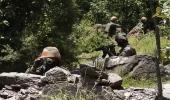Security agencies in Jammu and Kashmir are grappling with what they call the "hidden threat" of "conservation and consolidation" tactics employed by infiltrating terrorists, which was evident in the recent ambushes and encounters in North Kashmir and Kathua district.

Analysing the ambushes and encounters with terrorists, officials in the know of the matter said while security agencies are on high alert, the lack of ground-level intelligence -- human intelligence -- hampers operations.
Reliance on technical intelligence has not been fruitful as terrorists use online activity to mislead authorities. Officials feel that there is an urgent need for heightened surveillance to counter foreign terrorists, especially in the Jammu region.
The region, previously known for its peaceful atmosphere, has recently seen a surge in terror incidents, particularly in border districts such as Poonch, Rajouri, Doda and Reasi.
Attacks on an Indian Air Force convoy, a pilgrim bus and the recent killing of soldiers in Kathua highlight the evolving threat.
Under the "conservation and consolidation" tactics, terrorists infiltrate into Jammu and Kashmir but remain quiet initially, blend in with the local population and wait for instructions from handlers in Pakistan before carrying out attacks, the officials said.
Though security agencies are on high alert in Jammu and Kashmir after uncovering the "conservation and consolidation" tactic of the infiltrating terrorists, the absence of on-ground intelligence is playing a spoilsport for operations.
One official explained that technical intelligence has not been that fruitful as the terrorists leave signatures on the Internet only to confuse the security agencies.
Describing this as a significant shift in terrorist activities, officials emphasise the urgent need for heightened surveillance to prevent foreign mercenaries from carrying out their malicious intentions.
The April 26 encounter in Sopore, in which the foreign terrorists involved had been hiding for 18 months, serves as a stark reminder of the "conservation and consolidation" tactic. Evidence showed their connections with terror groups across Kashmir and their use of sophisticated weaponry.
Similar operations in June further dismantled hidden networks, exposed terrorists' plans and capabilities, and also threw light on a previously unseen high level of infiltration from across the border.
While two terrorists belonging to Rawalakot in Pakistan-occupied Kashmir were killed on April 26, dreaded Pakistani terrorist Usman Langda is said to have been killed in the June 19 encounter at Hadipora of Sopore.
The decline in HUMINT, coupled with the use of encrypted communication tools like "Ultra Set" phones by terrorists, makes tracking them difficult. Security agencies are urging heightened surveillance and public vigilance to counter this hidden threat.
While the terrorists' capabilities may have diminished, their intent remains a constant threat, a senior police official said.
Officials have highlighted the challenge posed by the use of encrypted messaging apps for radicalising and recruiting youths, and planning attacks. They have emphasised public vigilance in monitoring suspicious communication, especially among the youths, to safeguard the community.











 © 2025
© 2025